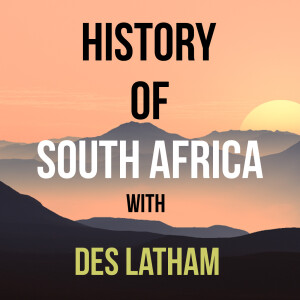
History of South Africa podcast
History

Episode 20 – The breakdown of Khoekhoe society in the Cape, corruption and miscegenation
 2021-06-27
2021-06-27
Download
Right click and do "save link as"
This is episode 20 and the expansion of settlers from the Cape is gaining pace.
At the same time, the Xhosa to the north are experiencing political upheavals, while further north, the Nguni speaking farmers have spread into the Free State and Transvaal highlands – now known as Gauteng.
The decline of the Khoekhoe chiefs and the increasingly coercive nature of the trade took place at the same time as another major development in the Cape. This was the intensification of labour relations between the Khoe and the Colony.
Ever since van Riebeeck’s time, some Khoekhoe had worked in the colony as cook’s assistants, domestics, building labourers and dispatch runners amongst other jobs.
Europeans did not hire Khoekhoe as herders or shepherds before 1670 because they feared the theft of their livestock – and then only under close supervision. However the rapid expansion into Stellenbosch and Drakenstein we heard last episode meant the Dutch and Huguenot farmers needed more labour.
There weren’t enough slaves so naturally as the Khoe lost their land and grazing rights, they took up more of these positions as workers. According to the census of 1690, there was one slave in the Bay area of the Cape for every nine cattle tended and for every bushel of seed sown.
Compare that to Drakenstein and Stellenbosch where there was one slave for every 63 cattle and twenty bushels of seed sown.
The Khoekhoe were now experiencing a rapid decline in their wealth and security and responded in large numbers to the new farms and their requirements. The Dutch official Van Rheede whom we met last episode wrote a scathing note to the colonists about the children of slaves – and by 1700 three quarters of these children had white fathers.
He said the children of slaves – dusky skinned, blonde haired and even blue eyed – should receive the same education as other children. The Freeburgers were shocked and disagreed.
view more
At the same time, the Xhosa to the north are experiencing political upheavals, while further north, the Nguni speaking farmers have spread into the Free State and Transvaal highlands – now known as Gauteng.
The decline of the Khoekhoe chiefs and the increasingly coercive nature of the trade took place at the same time as another major development in the Cape. This was the intensification of labour relations between the Khoe and the Colony.
Ever since van Riebeeck’s time, some Khoekhoe had worked in the colony as cook’s assistants, domestics, building labourers and dispatch runners amongst other jobs.
Europeans did not hire Khoekhoe as herders or shepherds before 1670 because they feared the theft of their livestock – and then only under close supervision. However the rapid expansion into Stellenbosch and Drakenstein we heard last episode meant the Dutch and Huguenot farmers needed more labour.
There weren’t enough slaves so naturally as the Khoe lost their land and grazing rights, they took up more of these positions as workers. According to the census of 1690, there was one slave in the Bay area of the Cape for every nine cattle tended and for every bushel of seed sown.
Compare that to Drakenstein and Stellenbosch where there was one slave for every 63 cattle and twenty bushels of seed sown.
The Khoekhoe were now experiencing a rapid decline in their wealth and security and responded in large numbers to the new farms and their requirements. The Dutch official Van Rheede whom we met last episode wrote a scathing note to the colonists about the children of slaves – and by 1700 three quarters of these children had white fathers.
He said the children of slaves – dusky skinned, blonde haired and even blue eyed – should receive the same education as other children. The Freeburgers were shocked and disagreed.
More Episodes
012345678910111213141516171819
Create your
podcast in
minutes
- Full-featured podcast site
- Unlimited storage and bandwidth
- Comprehensive podcast stats
- Distribute to Apple Podcasts, Spotify, and more
- Make money with your podcast
It is Free
- Privacy Policy
- Cookie Policy
- Terms of Use
- Consent Preferences
- Copyright © 2015-2024 Podbean.com





